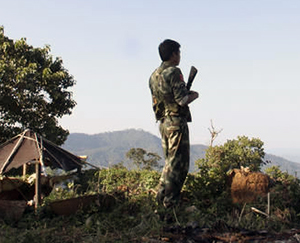Laiza (Myanmar), Dec 28: Ethnic Kachin rebels long at war with Myanmar troops say the government has only escalated fighting since Aung San Suu Kyi took over as leader, crushing the hopes that had led many ethnic minorities to support her party and leaving them with no confidence in the peace process that Suu Kyi has identified as a priority.
Rebels and observers say government offensives including airstrikes have increased since Suu Kyi and her National League for Democracy party took control in March. Suu Kyi's government has said little about the attacks, and the Kachin Independence Organisation accuses her of cooperating with the military.
"Suu Kyi tried so hard to gain this power for many years and she needs to make deals with the military in order to sustain her power," said La Nan, the chief spokesman of the KIO.
Rebels say they have been hit with airstrikes in areas of northern Shan and Kachin states including Mongo, a Shan town that was heavily bombed and suffered an unknown number of civilian casualties. Other fighting has occurred in Hpakant, center of Myanmar's lucrative jade-mining region, and Laiza, headquarters of the KIO.
Suu Kyi, who serves as state counselor and foreign minister but effectively rules Myanmar, faces high expectations from ethnic groups and the international community.
As opposition leader, the Nobel Peace laureate was held under house arrest by the former junta for years, but her landslide election victory in November 2015 ended more than half a century of military control.
Though she has called the peace process her top priority, many local and international political analysts do not see significant achievements since the NLD came to power, and say she has failed to cooperate enough with ethnic leaders.
"National reconciliation cannot be built only between the government and the military," said Yan Myo Thein, a prominent Myanmar political analyst. "There must be negotiation between ethnic parties, armed groups, the military and the government."
Ethnic Burmans form a majority in Myanmar, also known as Burma, but ethnic minorities make up about 40 per cent of the population. Some of those groups have fought for greater autonomy for decades.
Suu Kyi held a peace conference in late August attended by representatives of 17 of the 20 major ethnic groups, including the Kachin.
The conference was intended to build on a ceasefire agreement that ethnic groups insist include a political solution to their longstanding demands. Ethnic leaders have asked for political dialogue, but the peace conference met few of their expectations, and some may drop out of the next round, expected in February.
The conference was dominated by short speeches from a wide range of stakeholders, leaving little time for more significant discussion.






Comments
Add new comment